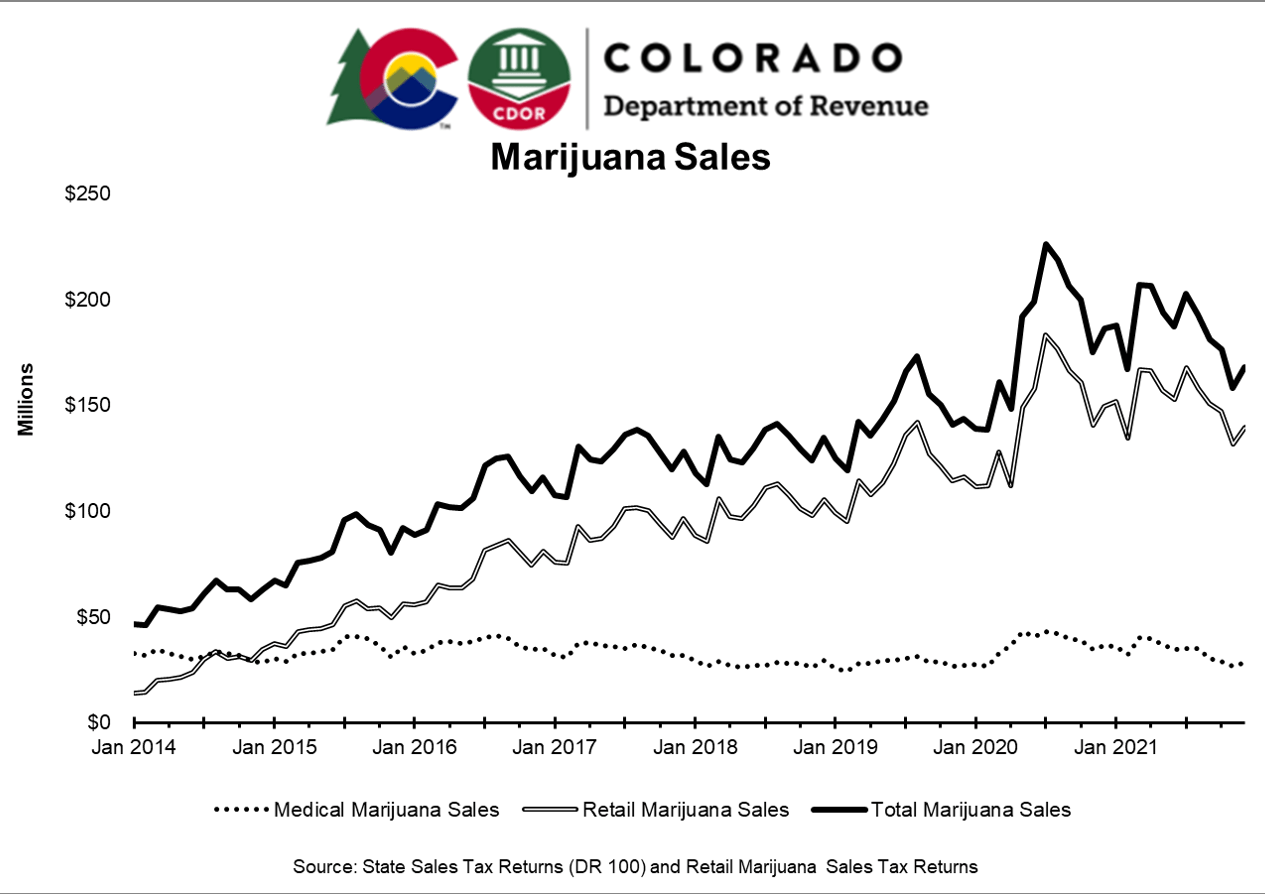Resources
Colorado state tax revenue from the legal cannabis industry surpassed $2 billion in January and the state has collected more than $88.7 million in fees.
In addition to state and local taxes and fees, cannabis businesses have an effective federal tax rate of about 70% – compared to about 26% for other businesses.
Did you know Colorado legal cannabis dispensary owners are unable to deduct normal business expenses like payroll and rent from their federal income taxes?
Marijuana has contributed over $320 Million dollars to Building Excellent Schools Today (B.E.S.T.), making up about 25% of the program's entire budget.
In FY 21-22 alone, nearly $15.3 million in state cannabis dollars went to state Affordable Housing Grant and Loans.
The Marijuana Tax Cash Fund collected $188.8 Million in FY 2021-22 alone.
In FY 21-22 alone, nearly $15 million in cannabis dollars went to the School Health Professional Grant program.
More than $15 million in cannabis dollars went to substance abuse treatment in FY 21-22.
More than $1.6 million cannabis dollars went to the Tony Grampsas Youth Services Program in FY 21-22.
Voters in 59 of 64 Colorado counties voted no on Proposition 119 sending a clear message against raising taxes on cannabis consumers.
Unlike other legalized substances, the marijuana industry has a 97% compliance rate for unauthorized sales.
Unlike alcohol, research has proven you can only get “so high.” Cannabinoid receptors in your brain eventually prevent the body from getting further intoxicated.
Did you know? Since legalization in 2005, teen use in Colorado has remained flat and is below the national average.
According to a recent poll by the Pew Research Center, more than 90% of Americans think cannabis use should be legal.
Did you know? MIG represents more than 400 cannabis business licenses across the state.
A 2021 study found that medical cannabis use was associated with clinical improvements in pain, function, and quality of life with reductions in prescription drug use.
Founded in 2010, MIG is the oldest and largest trade association for licensed cannabis businesses.
Colorado’s marijuana model has become the example for all other regulated cannabis states, and MIG works directly with policy makers to ensure that Colorado’s program is fair, tightly regulated, safe, and successful.
Safe Sales: Every marijuana sale in CO takes place on camera and requires multiple ID checks.
All regulated marijuana in Colorado is tracked from “seed to sale,” with oversight from the Marijuana Enforcement Division.
Established in 2010, MIG has led legislation for child resistant packaging, customer safety resources, and purchase restrictions for 18-20 year olds.
Marijuana is taxed at both state and local levels. This year Aurora built a new $34 Million dollar rec center, fully funded by local marijuana taxes.
The marijuana industry suffers from unfair Federal tax rules, which means that MIG members’ effective tax rates are around 71%.
A 2019 study showed that crime does not increase with legalization.
Conditions for medical marijuana
Cancer - Glaucoma - HIV or AIDS - Cachexia - Persistent muscle spasms - Seizures - Severe nausea - Any condition for which a physician could prescribe an opioid - Autism Spectrum Disorder - Severe pain - PTSD
Most marijuana businesses have access to banks, but because marijuana is still federally illegal, businesses are unable to access merchant processing services such as VISA or Mastercard.
Consuming higher potency marijuana does not lead to higher levels of impairment.
-- Journal of the American Medical Association (JAMA) 2020
71% of Colorado voters favor marijuana legalization. This has increased 10 points in the last four years alone.

Marijuana Industry Response to Release of Record Sales Numbers
MIG Press Release
FOR IMMEDIATE RELEASE
DATE: Friday, February 11, 2022
CONTACT: Madeleine Schmidt, 405-822-0533
Marijuana Industry Response to Release of Record Sales Numbers
Despite record setting sales last year, small businesses are struggling under increasing regulations, dated tax structures
DENVER – Yesterday, The Colorado Department of Revenue released new numbers indicating that Colorado’s cannabis industry has set another sales record with $2.2 billion in sales in 2021. While that number seems promising, it is not reflective of many of the serious challenges facing the industry including a state tax rate of 30% in addition to local taxes and fees, an effective federal tax rate of 70%, and a growing list of regulations. Despite record breaking sales, many cannabis small business owners are actually struggling to keep their doors open.
“While it seems exciting to hear ‘record sales,’ these numbers are not reflective of how the industry is doing as a whole, and we must put these numbers into perspective,” said Tiffany Goldman, Board Chair of the Marijuana Industry Group, the oldest and largest trade association for licensed cannabis businesses. “As a small business owner, myself, I know firsthand the challenges facing the industry in the form of federal tax rates and increasing regulations. Our members deeply value the ability to give back to the communities we live and operate in, but many are struggling to keep their businesses open, pay their employees, and support their families. We are hopeful that lawmakers in our state understand these challenges and are willing to work with us to support small business owners so that the industry can continue to generate economic benefits for years to come.”
In addition to an effective 30% state tax on recreational cannabis paid by both producers and consumers, and local taxes and fees ranging between 3% and over 7%, cannabis businesses have an effective federal tax rate of about 70% – up to 3.5 times more than all other Colorado businesses. Section 280(e) of the IRS federal tax code prevents cannabis businesses from deducting normal business expenses like wages, employee benefits like health insurance and paid sick days, rent, and equipment from their taxes. Instead, these expenses are treated as profit and taxed.
“Because of our tax structure, record sales don’t translate into high profits for the local businesses like mine,” said Tom Scudder, owner of EmJ's medical marijuana dispensary and part of Rocky Road Aurora. “We love to be able to give back to causes Coloradan’s care about like mental health, public safety, schools, and more, but we also can’t be a state piggy bank because the industry is heading to a real breaking point. We have fully complied with all of the new state regulations, and now we hope that we can change the conversation to how we can support patients, consumers and small businesses so we can keep our doors open.”
In November, voters in 59 of 64 counties voted no on efforts to increase cannabis taxes. MIG members will be working together with lawmakers this session to fight for policies that will support the industry moving forward.
###
About MIG: MIG was founded in 2010 by cannabis business owners and supporters who wanted to help craft Colorado’s earliest medical marijuana regulatory framework. MIG is the oldest and largest trade association for licensed cannabis businesses. Comprised of approximately 400 licensed businesses, MIG has strong representation and connections across the state. MIG advocates on behalf of the rapidly evolving needs of the regulated marijuana industry in Colorado with a reputation for innovative policy making and getting results for the state’s cannabis community.
Images

Additional Info
Media Contact : Madeleine Schmidt, 405-822-0533








